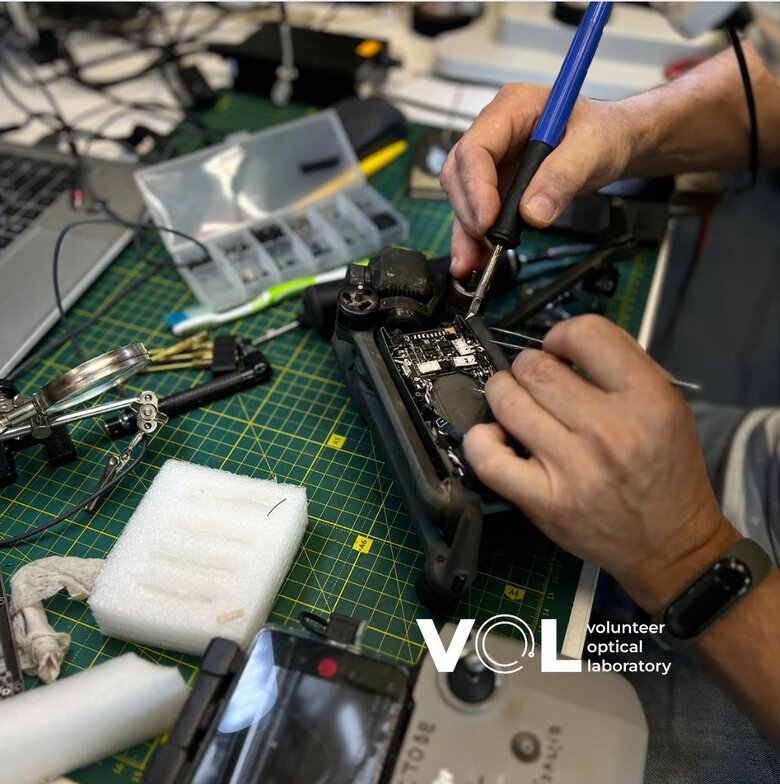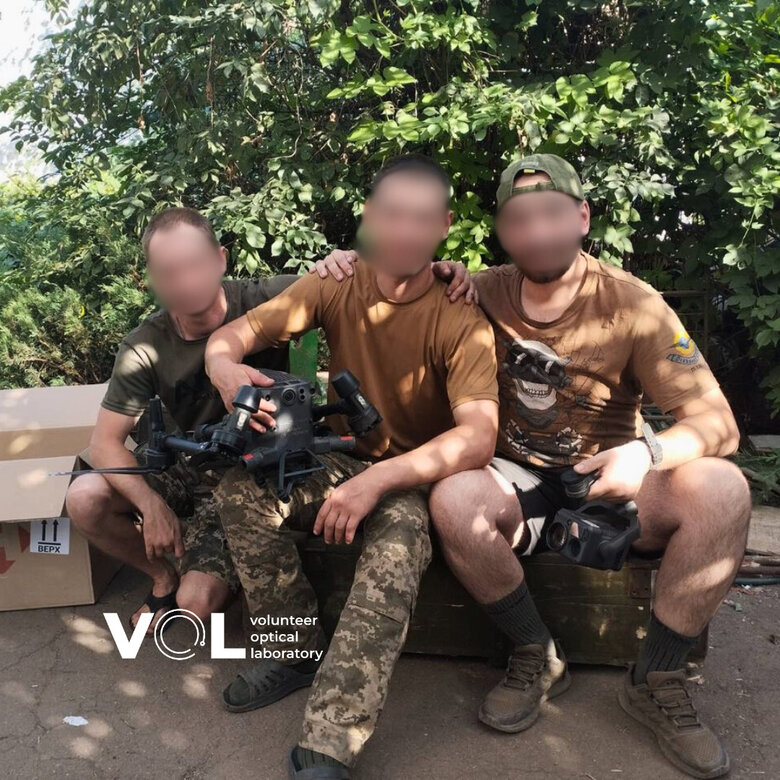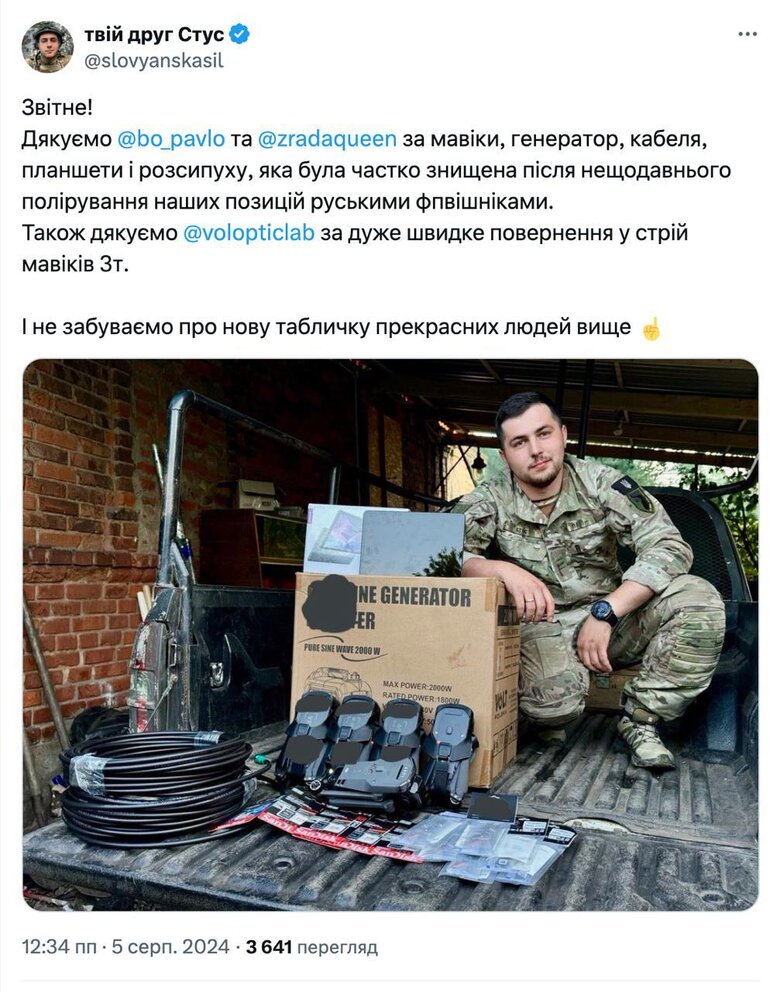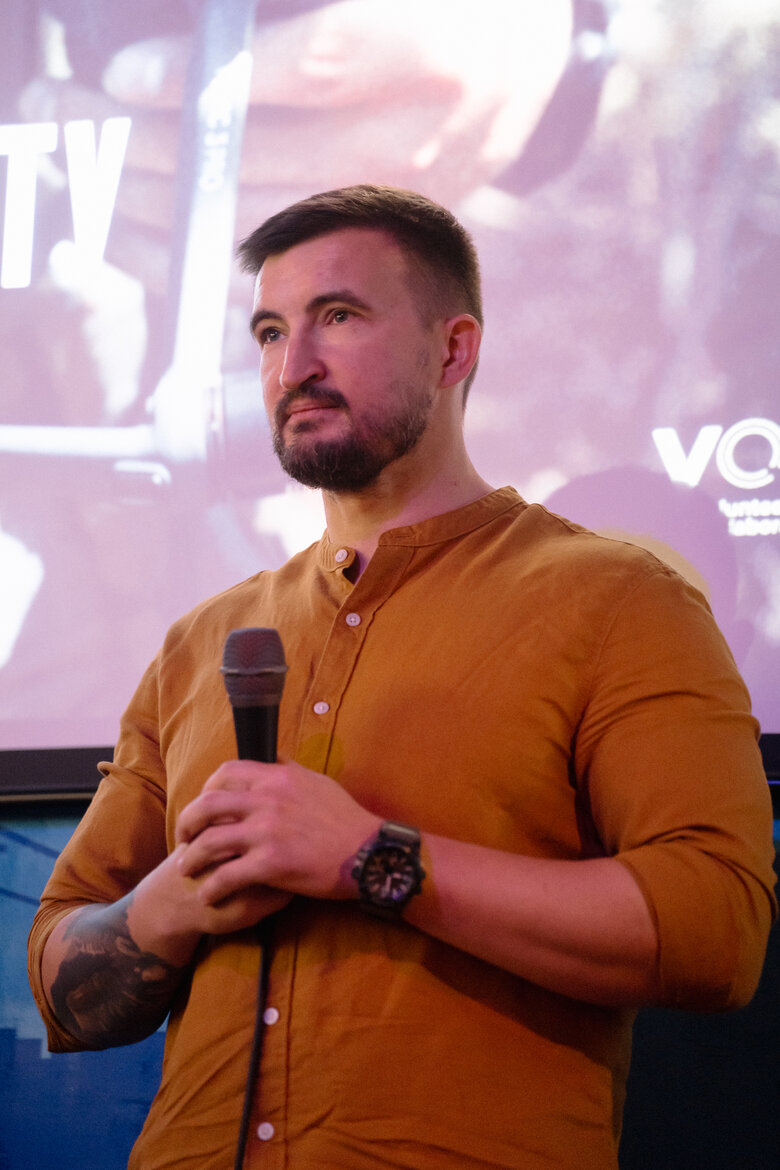"Here, thousands of drones are brought back to life": report from office of Volunteer Optical Laboratory
Censor.NET visited the office of the Volunteer Optical Laboratory (VOL) to see the work of the team that has repaired and returned almost 5,000 opto-electronic devices and drones to the war in a year.
For the Ukrainian resistance, the VOL is, without exaggeration, a repair hub of strategic importance. To understand this, it is enough to look at the basic statistics that the volunteers have posted on the home page of their website. To wit,
FOR THE ENTIRE PERIOD OF WORK
44,169,508 EUR - the cost of the repaired devices;
14,310 - the number of repaired devices;
EUR 5,532,303 was spent on repairs;
EUR 38,637,205 saved.
This data, which is growing every day, shows both the overall scale of the work and its effectiveness. At a time when the average Ukrainian's wallet is not very capable of making donations to buy new expensive devices, the VOL adheres to the credo "It is better to repair than to buy." And it not only saves public money in general but also strives to use every penny as efficiently as possible.
How do they do it? Let's take a tour of the Volunteer Optical Laboratory's office. Of course, without an excessive number of photos, since why show the enemy unnecessary information about a structure that he has long been interested in?
FROM OPTICS TO MAVIC: HOW AND WHY TOP MASTERS DELIBERATELY DO NOT WORK FOR TOP SALARIES
...Since its foundation in 2015 by military volunteers Ihor Fedirko and Andrii Vysochyn, VOL has been restoring night and thermal imaging optics for the Ukrainian Defense Forces. More than a year ago, the organization added another area to its resources - drones.
"During this period, we have been able to repair more than 4,500 drones worth more than 650 million hryvnias," says Ihor Fedirko. - "Mostly, we are talking about the most popular drones in the army - Mavic. Well, that is, DJI products are Mavic, Matrice from small to large, all modifications."
The VOL office is equipped according to European standards: there is a reception area, rooms for work and rest, a kitchen/dining room, and a warehouse for devices, drones, and their components. Craftsmen are working studiously at the workplace.
-"What do you do?" I ask one of them who is working on a damaged drone.
-We are restoring the device after the blast wave.
-How long will it take to repair it?
-A lot, because there is a lot of mechanical damage.
-What type of damage do you have to deal with the most?
-Explosive damage, more than half of them.
-And what else?
-Mice also like to chew in the spring and fall.
And here is another specialist, he works with a damaged optical device. What kind of device?
-I'm finishing repairing a PVS-14 night vision device," the young technician replies. "It was very dirty, there was a lot of corrosions inside, problems with the board, and I had to solder it. The problem was not very complicated: one small coil was out of order, and because of this, the device did not work. But now it is restored, clean, not a single speck of dust. As they say, optical purity!
-How long did it take you to fix this device?
-A couple of hours. But there are very difficult repairs that last for months. This is when there are no spare parts or the ability to carry out any diagnostics because the necessary equipment is not available. Then we have to wait. But in general, these PVS-14s are 90% of our work. In principle, we almost always have enough spare parts and donors for them.
-Your colleague who repairs drones named a blast wave as the main cause of damage. It is clear that optical devices have their own specifics. What is it?
-Most often, it's an ingress of moisture, which destroys the circuit board inside. And we cannot always restore or replace it. There are also mechanical damages, such as debris or blast waves. In such cases, it is most often possible to restore the device."
The VOL values its craftsmen because, firstly, they are professionals; and secondly, because, although they receive a salary for their work, it is much lower than in the market. This is despite the fact that, for example, a highly skilled engineer who can perform deep drone repairs - precision soldering and repair of motherboards, restoration of electronic and optical amplifiers, and other operations - is very expensive on the market.
Why, then, do these cool craftsmen work at the Volunteer Optical Laboratory? Because they do not want to work on a commercial basis for companies that sell weapons and military equipment. These people want to help the army through technological volunteering. How can you not appreciate such value-based and corporate patriotism?
We come to another craftsman who repairs drones.
- I'm finishing up the repair of the 30T (DJI Matrice 30T, - ed.)," he explains, "I had to replace the body, several beam connectors, repair the camera and a few other spare parts.
- It seems that everything had to be replaced.
- Yes, the drone arrived almost completely broken, with a pile of soil inside. We also received a donor drone with it, which was completely burnt out, but we managed to pull out some parts.
- How long have you been repairing this drone?
- It's been about three days now. It took about a day to replace the body, about a day to repair the camera, and another day to repair all the beams, replace the covers for the antennas, the antennas themselves, and solder.
As for the masters, there is a clear specialization in the VOL. There is a specialist in motherboards, a specialist in cameras, a specialist in assembly, disassembly, and testing. By segmenting all possible work, the Laboratory almost tripled the number of repairs per month. They take great care to optimize the workflow here, as the influx of orders is huge, and the quantity should not interfere with the quality of repairs.
SECRETS OF VOL: FROM COMMUNICATING WITH THE MILITARY TO ENCOURAGING DONORS
Iryna, the manager of the VOL, receives these orders from the military. Her job is stressful: more than 70 units apply to the Laboratory every month. Among them are the Unmanned Strike Aviation Systems Battalion "Achilles" of 92nd SAB, the 12th Special Forces Brigade "Azov", the 4th Rapid Reaction Brigade Rubizh; DIU: Kraken Special Forces, Shaman Battalion, Artan Special Forces, International Legion under the DIU, 3rd SAB, 72nd SMB.
Customers, of course, want to receive their optics and drones as soon as possible. And we need to communicate with each of them, tell them about the progress of the repair, explain why they cannot receive the repaired device right away. In such communication, a manager sometimes needs to be patient as an angel.
- Usually, the military needs it against the clock, maybe the day before yesterday," Iryna smiles. - "That's why we take it calmly. We understand the situation. We explain the situation as it is. Since there is a queue, we repair only for the military. However, sometimes there are exceptions - when they ask for it when they say we lost our last drone in combat... Then, perhaps, we put this order as urgent and give it priority.
- With all these requirements, it must be difficult for you. But what about the positive emotions after you've handed over the drone and it's performing tasks at the front?
- Of course, there are such emotions. When you tell a person that an order is ready, there are different reactions: super, cool, "you're the best". These are the best words you can hear!
- And then do they send you any videos on how the repaired drones or optics work?
- Yes, they do. There are various reviews, photos, video reviews, text messages.
So we've come to the financial issue: how does this repair ecosystem operate? Where does the money come from to pay the craftsmen's salaries, to buy equipment, rent the premises, and all the other expensive things?
The money is donated by donors, and you first have to reach out to them, get their attention, and convince them of your effectiveness. This is something that VOL has someone to do; Andrii, a fundraiser, and Yuliia, a communicator, are at the cutting edge of the process.
- "Who mostly donates money to the Laboratory?" I asked Andrii.
- These are mostly businesses that have not previously been involved in any kind of volunteer activity and are ready to provide funds. Because, of course, the entrance to large businesses is closed, relatively speaking, because of their cooperation with large foundations. In addition, most companies already support either the military directly or some volunteer foundations. So it's not easy, but we still manage to find donors. At the same time, we do not have a specific area of search. We have patrons who support specific areas; and we have patrons who give money for the work and the foundation in general.
- Do I understand correctly that you operate on the principle of a chain: one person can advise another, and so on?
- Yes. This is the main method. In addition, of course, there are media projects. For example, we recently took part in the Podilskyi Shuk charity fair. We raised more than half a million hryvnias there. It was a powerful story for us in the media because more than 3,000 people visited the fair that day. So they got acquainted with our foundation, our work, and donated various amounts to support us...
Yuliia, a communications specialist, joins the conversation. I asked her: how can a potential donor "sell" the topic of repair as more promising than buying new equipment? After all, people associate the word "repair" with a tedious and long process, and not with saving money for the army. It's a different matter to buy some brand new weapon or device: the idea of a new weapon that will shred the enemy into small pieces in a day causes excitement and a desire to donate.
- We try different ways to make it digestible," says Yuliia. - "We show how many repairs we can make; how many devices it can be. We communicate how many crews come to us. Right now, we have a current fundraising, and we have made it in a format where we have indicated the specific price of repairing one appliance. That is, a person can open his or her own jar to repair a Mavic. It will cost 7 thousand hryvnias.
However, it is still difficult to get across the value of the repairs, as our fundraising has been going on since April. And the goal is not that big - UAH 3.5 million. This amount will cover the repair of about 800 drones and opto-electronic devices.
That's why we are currently promoting our Instagram page in the media to attract the attention of potential benefactors and donors. We make dynamic reels to attract a new audience, show numbers and the difference. For example, in the "Math of Repair" classified column, we show in detail what work was done and how much money was saved in restoring the device. The last time we emphasized in the report how much money we saved for the community and the military, it worked well with the viewers. It attracted attention.
"REPAIR IS AN ATTEMPT TO CREATE ONE WORKING DEVICE OUT OF THREE BROKEN ONES. IT'S A KIND OF TECHNICAL CANNIBALISM"
Finally, we talk to one of the Laboratory's founding fathers, Ihor Fedirko.
- We agreed to be frank in our conversation, but what is the one thing we shouldn't ask you about?
- This is, of course, our location. We change our location almost every two years. Now it is not far away, but we have moved compared to last year. The expansion of the team has a positive impact on our relocation. That is, we are constantly changing locations.
In addition, you will not see our employees, except for me, in any of our photos or videos. We are trying to protect them from any recognition and identification with the defense industry.
We are transparent in all other matters. We are a foundation, so we report to our stakeholders, our donors. We say how much we spend, what we buy, how much we repair. This is mandatory.
- Do you have a selection process, some kind of competition to become a craftsman or manager? Or, realizing the security risks, do you hire people on recommendation?
- Yes, unfortunately, this is a problem. We try to minimize the number of people who come directly to the laboratory. We ask everyone to send their devices via Nova Poshta or Ukrposhta. That is, we are trying to secure the location in this way, among other things.
On the other hand, about 15% come. And we understand why. Because the average cost of a device or drone is from 3 thousand dollars. For many Ukrainians, this is still a lot of money. They want to see to whom they have given it. But thanks to Nova Poshta (which essentially acts as an intermediary between the customer and the actual contractor), they know who they are sending it to and to what address. That is, the person's phone number, the contact person. We have a person who accepts absolutely all orders. That's why we try to protect ourselves in this way. That is, to transfer this problem with logistics to logistics operators such as Nova Poshta and Ukrposhta.
- Does the state help you? Or at least does it not interfere?
- At least it definitely does not interfere. Yes, we have come across typical and probably correct stories, such as financial monitoring. They want to check transactions. This is normal. There were also tax audits, but they were very few and far between, and there were no claims that you should all be disbanded and closed down.
In other words, these are quite standard inspections. It's good that we pass them. It is also good for donors. We show that we are doing everything right, that everything is fine. We are absolutely honest and open. This helps. As for the state's assistance, I think the state is very focused on producing more weapons and military equipment. And if it is a service, it is mostly military equipment. Most of the money is applied there. And we are engaged in such a very niche specification as drones and optics (night vision devices and thermal imagers).
Although we have even seen some tenders from the state, where they offer the market to repair this equipment. But there are very, very few such tenders for such repairs and service. We understand that our country is currently in a rather difficult financial situation, and every spare penny, if it exists in Ukraine at all, is spent on the purchase of weapons and military equipment. And repair is an attempt to create a working device out of three broken ones. It's a kind of technical cannibalism.
- Do you feel competition in what you do?
- It is difficult for us to feel competition because we are a non-profit organization. We have some problems with deadlines, it's true because we do this work for free. Of course, we have a huge influx of orders. We cannot cope with it. We honestly explain to the military, who hand over their equipment to us, that it may still take some time because the demand is so high. Everyone wants to repair it for free. I understand that.
- And everyone wants to get their equipment first because they think they need it the most?
- Yes, they say: "We have the Pokrovsk direction!". "And we have Kursk!", ‘We have Kurakhove’ - and so on. These are all really fierce directions, heavy battles. I understand that there is a great need there. But I can't be a god who says: this is how it is for you, and this is not for you. I mean, everything is fair in terms of our queue.
- Has the emphasis on optics decreased due to the fact that you have switched to drones so actively?
- No, it hasn't. But UAVs are now much more prevalent in demand. Plus, we know that over the past six months, the state, the State Communications Service, and the Defense Procurement Agency have purchased a fairly large batch of drones from DJI. And we knew that in 2-3 months this volume would start to arrive for repairs, restoration, and service. And so it happened. We got a big wave. Now it has subsided somewhat.
- And what about the situation with optics?
- There is a big problem in optics in terms of parts and components. There is a very, very huge variety of them, even in terms of manufacturers. With drones, it is clear: there is DJI, it has three main models. You understand the nomenclature. This product is ideal for the army. Everything is structured, systematized, and interchangeable. That is, everything is as it should be.
Unfortunately, in thermal imaging equipment, night vision devices, we have such a hodgepodge that it is almost impossible to find the composition of parts. We tell our donors that they can help us not only with money but also find parts in their markets. Unfortunately, even my friends send us parts from Switzerland that are cheaper than if we buy them here in Ukraine. We can compare that our VAT is definitely higher than in Switzerland: 7% in Switzerland, 20-25% in Ukraine. Because of this, the price may be a little higher. But even with delivery here, it still comes out cheaper.
We also ask the military to provide us with drones. In other words, when a drone has already been run over by a tank, we realize that we can take some parts from it. So we are looking everywhere. But we realize that even from a crushed drone we can get something. But in thermal imaging technology, it's a real problem. Usually, it is 75% Chinese-made. They may literally have two identical models under the same serial number, but inside it may be a completely different device or a completely different lens. There is no interchangeability there at all.
- It's a really huge problem.
- And these manufacturers do not sell parts. We either snap up drones somewhere or look somewhere in the Western markets for what is being thrown out for sale as conditionally broken. Sometimes we also buy this broken equipment there.
- You have expanded the opto-electronic devices you repair with drones. Do you have any further expansion plans? I think that in about a year, you will start repairing EW systems as well...
- There were plans to repair radio stations because we realize that we have a dominance of motorolas now. But we saw that there is already a good volunteer movement that repairs them. So there was no point in taking it over.
My goal and, perhaps, my dream is to repair large optics and opto-electronic devices for military equipment. Sighting devices for mechanised regiments and tanks. Now we are already starting to receive opto-electronic targeting devices from ATGMs, even foreign-made ones. We are repairing them, and we are repairing them well. This is also a very narrow area, but a very necessary one. We think we will expand into this area. Although we are experiencing a shortage of specialists in opto-electronic devices. There are very few of them on the labor market. Even now, we are essentially training people from scratch. But they have at least a basic understanding of either optics or electronics. At the same time, such a specialist takes at least six months to grow...
- Nevertheless - I think the reader will agree with me - your success is impressive! Tell me, where can I donate to you? And what kind of help do you need besides donations?
- In essence, we are no different from classic charities. We accept donations on the monobank, via Paypal, and by direct transfers to bank details. You can sign up for a donation subscription on the VOL website at https://vol.com.ua/donat/ to regularly support the foundation's activities.
Jar of the Fund:
https://send.monobank.ua/jar/9Us1hZ8cNe
Bank details of the jar:
UA 86 322001 00000 2902 1998 0011 92
Bank details:
CHARITABLE FOUNDATION "VOLUNTEER OPTICAL LABORATORY",
EDRPOU 44764422, UA593220010000026007990001162 in JSC "Universal Bank"
(Bank's EDRPOU (Uniform State Register of Enterprises and Organizations of Ukraine) is 21133352, bank code 322001).
Purpose of payments: CHARITABLE CONTRIBUTION
PayPal
[email protected]
Crypto wallets
USDT (TRC20):
TH7pMwFoAAr1guDbJtLNzKGvZWWmZrupWG
LTC:
LXQKMq4j1MN9PwbvkmwPgkSoagPckkNE6P
The Volunteer Corps will also be grateful for drones of inoperable devices that still have surviving parts. The Laboratory has friendly units that literally use a fishing hook to pick up mavics near their positions, everything that has been flown at them, and send it to us.
That is, absolutely different options for cooperation: drones, parts that can be bought abroad and sent here, and money. In addition, we also need to develop a communication strategy for us. We are engineers, and communication in general is difficult for us. Now we have recruited employees who have been very good at raising money at that Podilskyi shuk. It really gives a very good result. And this is something we've never tried before, because we didn't even think that it was possible to cooperate so well with different communities in communications! Communities that are out of yours sphere, out of the military and military topics sphere. It worked out really well...
Yevhen Kuzmenko, Censor.NET








